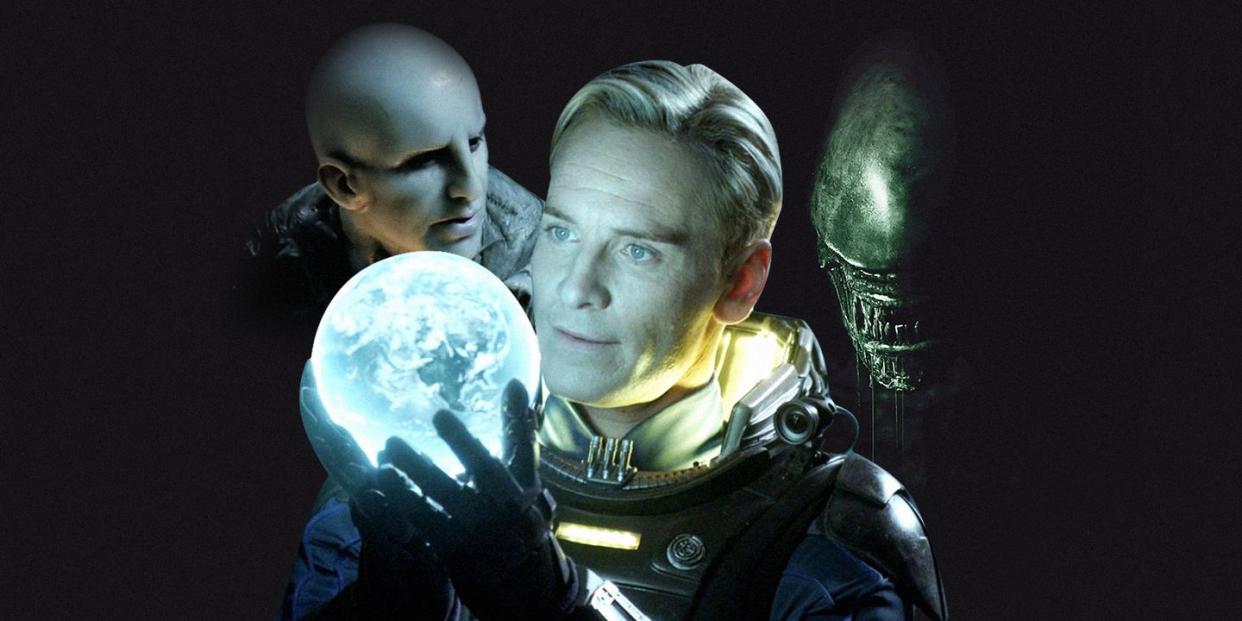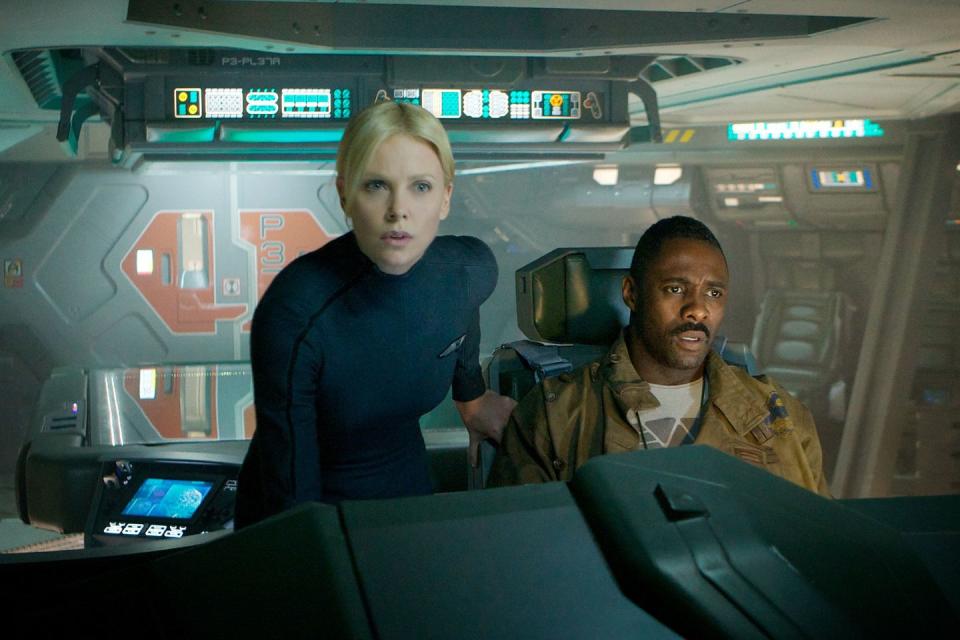It’s Time to Redeem 'Prometheus'

- Oops!Something went wrong.Please try again later.
Every so often a film comes along with the capacity to break a friendship in half. Those of us who saw Prometheus in 2012 may understand what I mean. The exploding head, the inexplicable pale giant, the unresolved mysteries of humanity’s origins—it all left me enraged. Where is the Xenomorph?! Listening to a friend outside the theater insist that Prometheus is an excellent film, that it’s an intelligent film, one that I might just not necessarily understand, well, it drove me up a wall. And it made me want to blast my phone, and our friendship, into the vacuum of space. I thought he was full of shit.
Almost 10 years after the release of Prometheus, Disney, now having acquired 20th Century Fox, shows no interest in revisiting the audacious, black-goo-infested world of the 2012 prequel. They announced in December last year that Fargo showrunner Noah Hawley will be shuffling the Xenomorphs onto television, promising an Alien show set on Earth that will somehow combine the horror and action of the first two films of the original quadrilogy. So the questions posed by Prometheus will remain unanswered.
At least, that's what I thought until I finally revisited the film for my podcast this summer. I realized that we've all been watching Prometheus the wrong way. We went into it expecting to find the origins of Weyland-Yutani, the Xenomorph, and based on what we learned from the (unforgettably promising) trailers, perhaps even humanity itself. We thought we didn’t get them, so we called the movie disappointing. But to quote Elizabeth Shaw, “We were wrong. We were so, so wrong.”

Prometheus opens with a strange and other-worldly sequence of a hulking white humanoid, who we later learn to be an Engineer, ingesting a potion of bubbly black liquid, which causes him to disintegrate into a frigid blue ocean. From there, strands of his DNA explode apart, and suddenly, life springs forth. Human life, most importantly.
We then forward thousands of years to meet Dr. Elizabeth Shaw, played by a stoic, but intensely-resolute Noomi Rapace. After discovering a series of ancient cave drawings with the help of her partner, she believes she’s found the root of human life–the Engineers, she calls them–and sees their cryptic engravings as an invitation.
Prometheus takes a literal approach to the Greek myth on which its title is based. The Greek story tells about the titular son of the Titans who steals fire from the Gods and gives it to the humans. As punishment for helping us lowly homo-sapiens, Zeus has Prometheus strapped to a rock so an eagle could peck out his liver for all eternity. Even by Alien standards, it’s pretty dreadful. But it’s this story that inspires Peter Weyland, founder of the infamous Weyland corporation (which hasn’t yet merged with Yutani), to fund Shaw’s mission, and attempt to remove the question marks from the mysteries of humanity’s origins.
Like it or not, you’ve got to admire Scott’s audacity in giving us such an expansive new scope for the franchise. It's a risky and potentially lethal undertaking. None of the Alien sequel directors had the guts to blow the franchise up this big, not James Cameron, not David Fincher, not even Jean-Pierre Jeunet, who pushed the series to its absurd extreme in Alien: Resurrection (which, while I have you here, is also tragically under-appreciated).

In short, Prometheus is a story about humans going to quite literally meet their maker. Our maker, as it turns out, isn’t so much interested in meeting us, as he is intent on wiping us from the face of the universe. When the crew of the Prometheus ship arrives on the planet on which Shaw believes our Gods reside, they find something far closer to hell than heaven. The derelict Engineer craft that’s crashed-landed on LV-223 is a cold, unrelenting half-circle of suffering, full of parasites who penetrate a body from the jaws inward, with a black goo that can both turn a body into a monster and an infertile woman pregnant with something resembling, well, the devil.
There in the derelict ship, they finally meet an Engineer–the last of his kind, perhaps–and when they wake the sleeping giant, he’s not very happy to see us. It’s not Shaw’s fault, though. Weyland reveals that the true reason he’s gathered these explorers for Shaw’s mission is not to find the Garden of Eden, but to pull the roots out of it, to feed on its sap, to drink from the fountain of youth. He wants that fire for himself. Weyland’s created life, referring to his android David (played with impossible finesse by Michael Fassbender), and because of that, he believes himself to be a God, too. Weyland commands David to ask the Titan for the secret to eternal life, because “Gods should live forever,” and in the face of such hubris, the Engineer rips David’s head off, and bashes Weyland to death with it.
The planet they’ve found, it turns out, is not the Garden of Eden, but a gigantic bunker full of weapons of mass destruction. The bioweapons are, of course, the legendary Xenomorphs, or at least some early form of them, and the Engineers were going to use them to kill us all. Why? “Why do they hate us?” Shaw asks. Why would our creators want to destroy their creation?
This is the question, really, that sits in the center of Prometheus. It’s the scene in which the lumbering ancient astronaut turns on the human explorers that makes Prometheus such a deafening (and legitimately terrifying) statement in the Alien series. It’s powerful, unexpected, and pitch-black. Like all the Alien movies before it (except, I guess, Aliens vs. Predator: Requiem, which is, to put it lightly, dogshit), Prometheus isn’t a movie about the evil of monsters, but rather, the men who use them for their own gain. In this case, it’s a vengeful God who’s made the monsters. And he’ll kill us with his bare hands if he has to.

For over a decade now, people have complained that Prometheus doesn’t make sense, that Scott never tells us why our creators despise us, and that, because this goes apparently unresolved, the movie just doesn’t have a cohesive message. They say it can’t live up to such bulletproof classics as the first three Alien films, since those combine satisfying horror action with very simple motivations–in those films, the Aliens are among us, and we have to kill them before they kill us. That’s it.
Although it’s a pretty lousy way to enjoy the vast and colorful world of film—always requiring directors to answer all the questions they ask—if you are looking for conclusions, they’re all there in Prometheus. You might just not have given the film enough of a chance to notice them. The humans in Prometheus, except for perhaps Dr. Shaw, are prideful creatures of ignorance, vanity, and, of course, bottomless greed. One of the central criticisms of Prometheus is that the scientists aboard the Prometheus are too dumb to be believable, that they operate with such arrogance that it’s almost impossible to sympathize with them. But have you ever considered that Scott might have characterized them that way for a reason?
Weyland’s only funded this mission for his own self-sustenance, his vain belief that he is superior to all other humans, and after all that, for whatever riches might await the discovery of eternal life. His daughter, played by Charlize Theron, is an ice-cold, unempathetic Weyland operative, devoid of even the most basic tenets of humanity that would allow the explorers aboard her craft to properly do their job; she’s only there to follow orders. You can go down the line–Holloway, Shaw’s partner, constantly abandons and disrespects protocol due to his overwrought confidence, the biologist thinks he knows enough about animals to pet a deadly space snake, the geologist only wants to study rocks; he can’t be expected to help in anything else. And the argument could even be made that Shaw herself is a tragically arrogant character, with her obsession to find the basis of human life driving her crew into some of the most dangerous and unspeakably brutal situations imaginable.
You don’t need to look far beyond the borders of Prometheus to see why, after more than 30 years since Scott made the relatively optimistic Alien (hey, at least Ripley survives with the cat), the director may have become a bit more nihilistic about humans. The way in which we’ve torn this planet to shreds, how we’ve turned the natural world into our own personal toilet, how tax-skipping billionaires rocket off into space instead of trying to solve real, dire issues such as poverty or world hunger. The misery, the violence, the subjugation constantly frothing around the corners of our every waking day–hey, maybe he’s trying to tell us something here?
I think, by setting his sights on such grander, such darker ideas, Scott must have known he was going to kick the hornet’s (or, neomorph’s) nest. Perhaps understanding that the film would be absolutely loathed if it ended with the image of our God-like creator being sucked into the stomach of a scary octopus monster and quite literally combined together to create Satan incarnate, Scott sends Shaw back into space, where her journey has yet to really begin. At least, it seems that way before Alien: Covenant begins.
𝑃𝑟𝑜𝑚𝑒𝑡ℎ𝑒𝑢𝑠 ℎ𝑎𝑠 𝑙𝑎𝑛𝑑𝑒𝑑. This week we're going down the rabbit hole of Ridley Scott's audacious (and deeply debated) return to the ALIEN series, PROMETHEUS.https://t.co/EqXoNpRgYN
No guests today. Just Adam, Dom, and the angry Engineer who created them. pic.twitter.com/JC4UboVuWx— Xenomorph Summer: An Eye of the Duck Miniseries (@eyeoftheduckpod) August 16, 2021
Although Prometheus tracks with so many of the themes from the franchise, this is another big, and probably for most fans of the series, unexpected departure from the Alien genetic code. Whereas Ripley would have returned to Earth at the end of a movie like this, to go back to her home, where everything is safe and cozy, Shaw instead resolves to finish her mission, to find our creator’s true home planet. Not because, like Prometheus, she wants to steal their technology and use it to bring glory and riches to the humans. But because she’s curious. She just wants to know what’s out there. I think if you start Prometheus with this humble curiosity in mind, you may have a different–and even revelatory–experience.
Since Scott will likely never get a chance to tie off the prequel trilogy he all-but-promised us, this film, with all its philosophy and promises of grandeur, will never feel fully satisfying. It'll always appear a bit smaller than it needs to be. But remember, as David says, "Big things have small beginnings."
You Might Also Like

